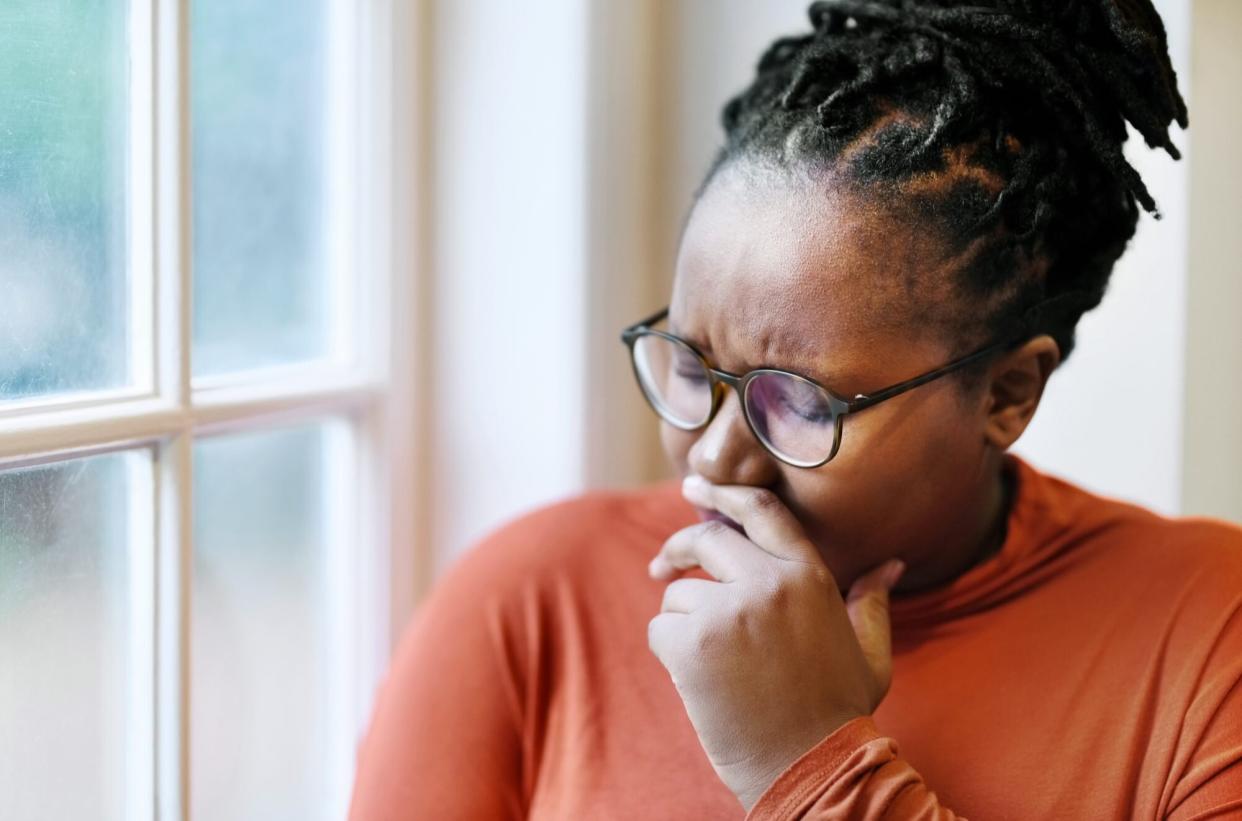6 Therapist-Approved Ways to Deal With a Trauma Anniversary

Getty Images
Welcome to #Adulting, the ultimate breakdown of all your grown-up needs. These articles are here to help you feel less alone and answer all your personal, financial, and career questions that weren't answered in school (no judgment, we get it!). Whether you're looking to find out how to tackle laundry or you want a deep breakdown on how to make a savings plan—we've got you covered. Come back every month to find out what life skills we're upgrading next and how.
Today is George Floyd's Anniversary.
I've always thought of myself as a fairly resilient person. Once I get over something, I get over it for good. But on the anniversary of my divorce, when I found myself crying my eyes out and unable to get out of bed, I was confused. I had already come to terms with the end of a forever relationship and was over my ex, so why then did my wounds seem fresh? Well, I Googled and found out that this emotion is called the anniversary effect, also known as a trauma anniversary. According to Psychology Today, it is "a unique set of unsettling feelings, thoughts or memories that occur on the anniversary of a significant experience."
Thanks to education and therapy, I've learned how to cope a lot better since then. In fact, I had my fourth trauma anniversary last month, and I made it through the day fairly easily.
Unfortunately, trauma anniversaries are very common. According to the National Council for Behavioral Health, 70% of adults in the U.S. have experienced some type of traumatic event at least once in their lives—like a bad breakup, sexual assault, racism, unexpected death, etc. And with so many traumatic events that occurred in the U.S. in 2020 alone (the coronavirus (COVID-19) pandemic, George Floyd's death, Breonna Taylor's death, racism against Asian Americans, etc.), most Americans are guaranteed to, unfortunately, experience the anniversary effect for themselves this year.
However, remember this: When the date of the event comes around after a year, it's natural to fall apart. If you're looking for healthy ways to cope with the anniversary of a traumatic event that's significant to you, read on for expert advice.
How to cope with trauma anniversaries:
1. Acceptance is key.
Avoid denial at all costs. I tried that once and it backfired badly. I'd been feeling anxious and sad for a few days before the first trauma anniversary but I didn't want to acknowledge it. I thought pretending everything was fine would "make it all go away." But that's not the way trauma works. It can last for a long time and the best you can do is acknowledge its existence so that you can find healthy ways to manage it.
You may not feel like yourself before, on, and after the trauma anniversary—and that is perfectly normal. On my second, third, and fourth trauma anniversaries, I accepted that I would be less functional and emotionally stable than usual for a few days, and that made a huge difference to my mental health. Allowing myself to be less than okay also helped me feel less anxious.
2. Keep yourself busy.
All that jazz about an empty mind being the devil's workshop is true to a certain extent. Make sure you plan ahead to have a busy yet flexible schedule. The point is to have something to do so that you don't have the time to dwell on painful memories. As long as whatever you're planning is not harmful to you or someone else, anything works to help you get through the day.
For some people, this might mean getting work done. For someone else, this might mean watching their favorite TV show. For me, it was a mix of doing work and watching Netflix. However, around 8 p.m., I couldn't distract myself anymore and just wanted the day to be over. So I had an early dinner, took a sleeping pill, and went to bed soon after.

Getty Images
3. Feel the pain.
Sometimes, the best thing to do is to set aside a few minutes to process the trauma you went through. In my case, I was feeling anxious, betrayed, and overwhelmed, especially toward the end of the day. Right before going to sleep, I spent some time thinking about everything that had happened on the trauma anniversary. I let myself cry as I got flashbacks of that day and random memories with my ex-husband. My tears were cathartic and helped me grieve. While I cried in private, I knew that this was not a sign of weakness. In fact, Cio Hernandez, Ph.D., therapist, trauma specialist, and founder at Reach Your Goal Now, says that even the most resilient people struggle when it comes to trauma.
"However you survived what happened to you, your brain, mind, and body suffered an indelible blow that is not likely to be forgotten," she explains." Days, weeks, and sometimes months before a trauma anniversary, my clients tell me that they start to have symptoms of post-traumatic stress like impending doom, dread, heart pounding, chest tightness, difficulty sleeping, irritability, lack of concentration, lowered ability to function at school or work, flashbacks or videos that repeat the details of the event as if it were happening again." Dr. Hernandez explains that while tears may flow at inopportune times, it's important to give yourself a break and take care of that younger version of yourself who lived through the traumatic experience.
4. Try to steer clear of impulsive decisions.
As a general rule, don't do anything you wouldn't do on a regular day. For example, this year, I thought of shaving my head to try and put a positive spin on the trauma anniversary. Many women have been rocking shaved heads in the pandemic and in my opinion, it is a major power move. But I decided to take baby steps.
A few days before the D day, I cut my shoulder-length hair super short to see how I felt about it. I was unhappy to have short hair, which meant that I would certainly have been miserable with no hair. So I scrapped the plan. While I felt bad for chickening out at the time, in hindsight, I know I made the right decision. The thing is, I've long believed in the "turn your pain into power" school of thought. It has worked for me on occasion and many of my personal heroes, as well. But as human beings, we have to accept that sometimes pain is just pain—and that's okay.
5. Get rid of clutter.
Decluttering may or may not be something that appeals to you, but it can help a lot on bad mental health days. Personally, I'm not a big fan, but I've observed that it helps me cope when I'm in a bad headspace. I guess it is a simple enough activity that helps me feel productive. Also, it is symbolic in the sense that when I throw out or donate things that no longer serve me, I am also eliminating memories of people and events that I no longer need in my life. Last year, I threw out my wedding album, and this year, I gave away the gifts my ex had returned to me. It is important to free yourself of reminders of a traumatic event.
Jeffrey Ditzell, DO, founder and psychiatrist at Jeff Ditzell Psychiatry, who specializes in treating individuals with PTSD, explains why decluttering is important: "This will help to avoid unintentionally being triggered at a time when you are not fully ready to process thoughts productively."
6. Seek professional help.
Like many people, I used to believe that having a support system would be enough to get me through depression, anxiety, and PTSD. While it is helpful to have loved ones who know of your struggles, I now know that regular people are not equipped to deal with what therapists handle on a daily basis.
On or even days before leading up to your trauma anniversary, make sure you are in touch with a therapist. Due to the pandemic, everyone's mental health is suffering. And with the George Floyd anniversary, things might be harder than usual for some of us this year.
I, too, began seeing a psychologist this month after I could no longer handle the consequences of the pandemic. If you can, try and take action as soon as you notice worsening signs of depression, PTSD, or whatever mental health condition you may have. Dr. Ditzell says, "Many people will seek professional help after dealing with a painful anniversary, but a more useful approach might be to schedule an appointment with a mental health professional prior to the difficult anniversary. This allows one to process the event in a controlled setting with a trusted counselor that can not only guide you through the process but also comfort you should the emotions become overwhelming."

